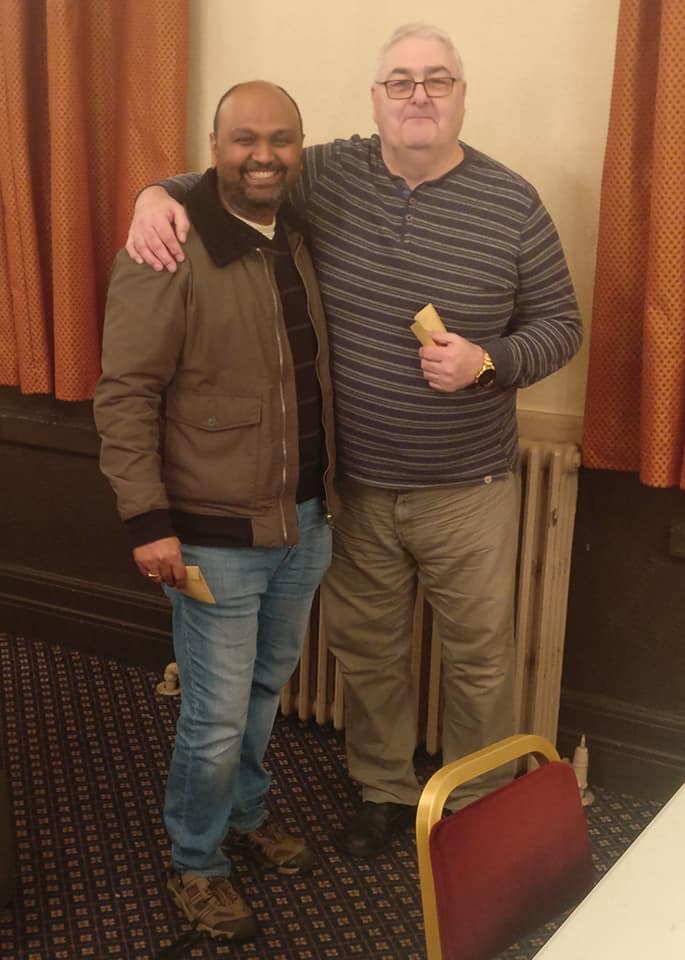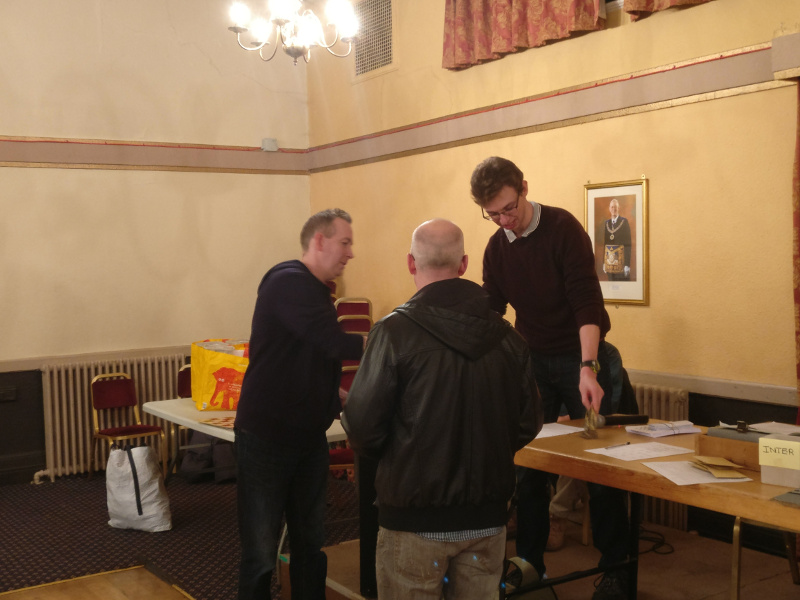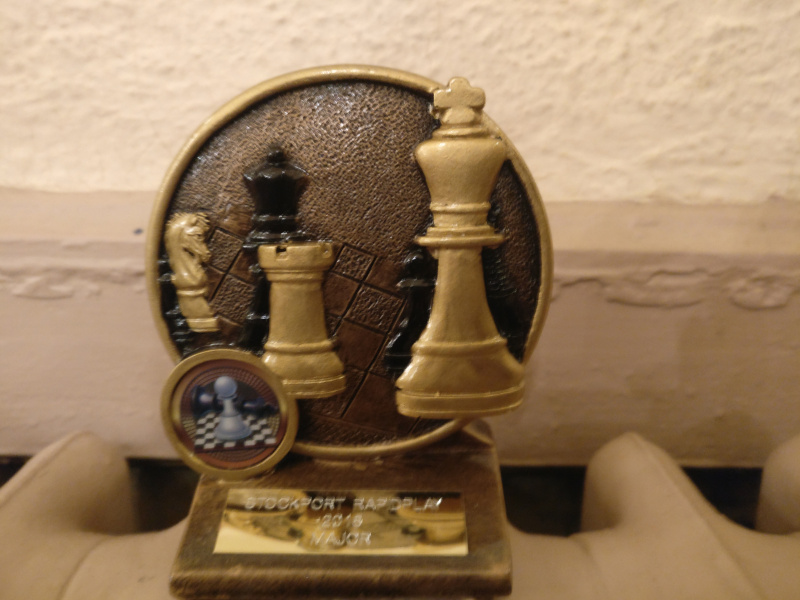News, Games, etc
Stockport Rapidplay 27th January 2019
Vijay Kakarparthi and Jeff Foy finished joint second in the Minor with 5 out of 6. There was also a good performance by Mark Hann in the Open, finishing joint 5th with 3½, including draws against the eventual winner IM Joseph McPhillips, and FM Paul Macklin. Below are Jeff & Vijay at the prizegiving.2018 British O65 championship
(by Reg Clucas)Having turned 65 this year I was eligible to enter this event, instead of having to compete with the young whippersnappers in the Over 50 section! The congress this year was held in Hull, not as pleasant as Llandudno last year, though the venue itself in Hull City Hall was quite impressive.
In terms of FIDE ratings of the entrants, I was ranked just above half way, which meant that I got to play one of the lowest ranked players in the first round, Derek Harvey of Hastings. I did not gain any great advantage with the Black pieces, and the game seemed to be heading for a draw until Derek missed a pinning tactic which allowed me to win a pawn in the endgame, enough to win the game.
Round 2 I was White against Kevin Bowmer of Loughton, grade 185. I made a silly error in the opening allowing him to cripple my pawns and was always struggling after that. I tried to turn things round by changing the material balance so that I had Rook & 2 pawns for 2 Bishops, but this only made things worse as the Bishops were far too strong. Kevin went on to share first prize, so I suppose I shouldn't feel too disappointed.
It didn't get any easier in round 3 with Black against Ken Norman, grade 191 and a two time former winner of this event. I got a reasonable position from the opening but then missed a tactic....
So 1 out of 3, and another tough game awaited in round 4, White against Colin Ramage of Barking, grade 172. I found some of his games from previous events and discovered he was fond of the Latvian Gambit, so I spent the morning brushing up on this. And I got lucky, because he played the 3..Nc6 variation that did not figure in his previous games that I looked at, but which nevertheless I had studied in some depth and was sure was good for White. As a result I was able to rattle off the first 9 moves in no time at all, which he must have found disconcerting. Here is the game.
Round 5 I had White again, against Alastair Dawson of Dundee, who has no ECF grade but performed at over 160 in this event. In a Tarrasch French he made a thematic exchange sacrifice on f3, leading to an interesting position, but shortly after took a draw by repetition.
In round 6 I was Black against Peter Hughes of Calderdale, grade 151. I had a slightly worse position from the opening, but didn't have any obvious weaknesses and Peter accepted my early draw offer.
In the final round I had White against David Levens, grade 152, who had beaten one of the pre-tournament favourites, Mike Surtees, in round 1. David made an unsound piece sacrifice which I answered with some even less sound tactics when a quiet move would have given me an advantage. So another loss, leaving me with 3 out of 7, slightly disappointing as I had made the same score in the O50 event last year. But in terms of ECF grading performance it was about par for the course, though I did lose over 50 FIDE rating points, due partly to my FIDE rating being unrealistically high, and the ratings of some of my opponents being unrealistically low.
There was a noteworthy finish to the event involving North West player Oliver Jackson. Oliver was in with a chance of sharing first prize going into the final round, but his scheduled opponent had to withdraw at the last minute. Oliver could therefore have had a free point, but very sportingly agreed to play another player from further down the field who also had no opponent. The game lasted a full 5 hours before Oliver was finally able to win, thus gaining a deserved share of the title.
Heywood Congress June 2018
(by Vijay Kakarparthi)I entered this section as it was an interesting one. It was not U120 section like other congresses but it was for players who have never achieved 120 grading. I was surprised that I was the highest graded player along with Joe Hirst. We both had a grade of 111.
Round 1: vs Richard Bohm (80) - Richard opened with e4 and was waiting for me as I reached the table late. I also took a few minutes to decide whether I should open with my favourite Owen's defence or the recently acquired Modern defence. Not wanting to take a chance I started with Owen's defence 1…b6. However, after the first few moves I was able to double fianchetto and the position ended like that of Modern defence. Middlegame trick worked and Richard dropped a knight. It was not so difficult then on as I went for piece exchange and my Rook penetrated to the second rank. Mate was inevitable and Richard resigned.
Round 2: Vs Dave Cook (97) - Having played Dave before I knew he would go for the Modern Scandinavian defence. I prepared myself for it during the break. I stuck to the main line and we blitzed through the opening. Game was fairly even but I sensed Dave was lining me up for a back rank mate. I let him go ahead with his plan as I knew he can't get it as his Queen was pinned against his king. He dropped his knight in the hope of getting the mate only to realise he couldn't do it. Like game 1 went for exchanges. With material down he went for some cheap tricks and dropped his Rook. That was the end of the game.
Round 3: Vs Alan Gardner (99) - Alan started with 1.d4 and I decided to go with Chigorin defence. In the typical Chigorin fashion I gave up my bishop for the Knight. Alan then launched a strong attack on my king side. I knew I could defend the position and lined my pieces for the queen side attack. At the same time my queen could jump into the king side if the attack gets stronger. To keep the attack going he tangled his pieces and dropped his knight. A series of exchanges followed and a piece down was difficult for him to hold the end game and was mated.
Round 4: Vs Jeff Foy (97) - Jeff decided to go with Caro Kann defence against my e4. I took 5 mins on move 2 deciding whether I should go for the main line or an interesting sideline I had prepared in the morning. I felt the double-edged sideline was risky at this stage of the congress and chose the main line. He defended very well and the game reached to a Rook and Knight vs Rook and Bishop end game. Though his Bishop was weakly placed I was unable to see a winning combination. He offered a draw and I accepted.
Round 5: Vs Dave Thorp (94) - Having played and drawn against Dave in the Blackpool congress I knew he would go with e4 and went for the same Owen's defence line we had played in our earlier encounter as I had prepared for a stronger middlegame. Knowing where the game was heading I was playing fairly quickly and let him attack my c7 square and dropped a pawn. He went for the attack then, but I was able to defuse. I knew I couldn't win it unless he blunders. Whereas he had all the chances of winning if he played accurately. In a dubious position I offered him a draw and he accepted. Stockfish analysis later showed that it was a losing game for me if I had continued. We both waited for other games on Board 2 and 3 to finish.
At the end of the congress, Andrew Beswick won on Board 2, making it a three way tie along with Dave and myself. All the prizes were shared by 3 of us. I was happy at the end of it as I had a better progressive score and played all my games on the top board of the section. It was my first congress win as well. Though I was happy with the way I played on Saturday, I wasn't happy with my game on Sunday. Hopefully I should be able to play better chess next time around.
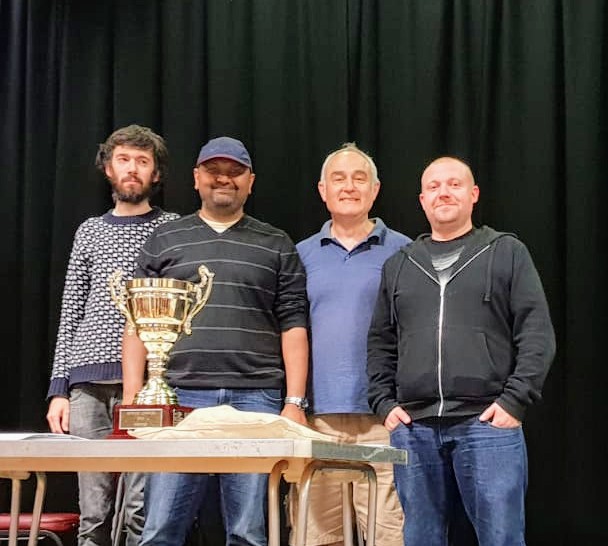
Blackpool Congress 9-11 March 2018
(by Vijay Kakarparthi)I entered the standard section for players rated under 115. With my rating of 111, I started off on 12th place. I had a slow start. I was playing black facing an opponent graded 97 with the Tarrasch variation of French defence. I won the a-pawn by move 10 and I had the opportunity to win the b-pawn as well. For some strange reason I decided not to take it as I felt it was a poisoned pawn and my queen could be trapped. Later when I checked with my computer, it said I could have safely taken it. I was struggling for tactics and couldn't see anything on the board. It ended in a tame draw.
Day 2, Round 2 I was playing black and got to play my favourite Owen's defence. Though I gained equality in the opening my opponent graded 94 played accurately not giving me any opportunity to break in. This one also ended in a tame draw. I was dejected at this point as I was not in a reckoning for a prize by round 2.
Day 2, Round 3 I was hoping to get back to the top boards. With me playing White against an opponent graded 97, it was another Tarrasch variation of the French. This time I was determined not to go for safe moves. It needed some adventurous chess and I found some tactics in the middle game to win material and then went on to win the game.
Day 3, Round 4, I was playing Arthur Ryder of Denton graded 102. This time he played d4 and I got to play my favourite against d4 i.e. the Chigorin defence. The game was fairly even till the end game and I was getting upset as I was staring at another draw. At this point I found a tactic and managed to push my king till the 2nd rank. His rook was tied protecting his only queen side pawn and my rook was active to support my king. I ensured I take home the advantage. Another win took me closer to the top boards.
Day 3, Round 5, I was playing Jeff Wilson of Blue club graded 103. I was white this time and got to play my favourite Scotch game with e4. I was determined to push this to the limit and squeeze a win. He blundered in the opening to go an exchange down followed by a pawn and made my task easier. My constant pressure on the king side tied his pieces down and he was running a risk of losing a Bishop. At this point he threw in the towel. Another win and I finished with 4 points out of possible 5.
I had to wait for others to finish to see whether I get a prize. I decided to head home fairly confident that I wouldn't win one. The lad Joe Hurst whom I had beaten comfortably in other events played good chess and went on to win the section. I returned satisfied that I did not lose any games in the event.
Stockport Rapidplay 28th January 2018
(by Vijay Kakarparthi)The annual Stockport Rapidplay Championship took place at the Stockport Masonic Guildhall. It was a 6 round event with Open, Major (Under 170), Intermediate (Under 140) and Minor (Under 110) sections. Mark Hann and myself from our club took part in the event. Mark entered the Major section. Since he was graded 169, he was the top seed in this section. I entered the Minor section and started the event on 11th place.
Mark lived up to the expectation of top seed and shared the first place with 5 out of possible 6 points. He won the first 2 rounds. It was an impressive performance considering he hasn't played any congress for a long long time. Mark also won the trophy for the highest scoring Stockport League registered player.
With the recent surge in the rating, I entered the event with a high. It started very well. I won the first 3 rounds. First round was a comfortable victory against the 10 year old who kept on losing pawns and the game. Second round was closely contested game where my opponent missed a zugzwang and handed over the game. Third round being a satisfactory win against Philip Shaughnessy of Urmston. It was revenge game as he had beaten me in the English Rapidplay at Liverpool last year. My fourth round was against Andrew Beswick of Chorlton. I messed up the middlegame to go down an exchange. However, Andrew messed up the endgame to lose a piece. I somehow finally managed to draw the game in a stalemate with just 5 secs left on the clock. Andrew went on to win the Minor section. There has to be a horror round whenever I play the congress and that was round 5. It was against the last year's winner Tony Hunt of Sale. In a closed game I managed to tie up his bishops and was in control of the game. I made one bad move which resulted in series of exchanges and he emerged better and went on to win the game. My last round also ended in a draw. I will let you decide whether I did the right thing here. With opposite side castling, there was a pawn storm on my king side and I managed to defuse it. However, in the process lost my queen for a rook, knight and a pawn. Though the material was equal, I was a bit worried as couple of pawns were looking a bit weak. My opponent had 80 secs on the clock and I had 7 minutes. He offered a draw and I took it. Later on I felt I should have played on and could have won on time. Anyway, was reasonably happy with the performance. Started on 11th position and finished on 8th with 4 out of possible 6 points.
Mark's report - I also entered the event on a high, having beaten a 190+ rated player during the week. In Rounds 1 and 2, I defeated Jim McKie of East Cheshire and Phil Colville of Macclesfield by gaining slightly better positions and slowly grinding them down. In Round 3, I came up against my fellow top seed, Andrew Jaques. This was the most interesting game I played. As black, I gave up the exchange and the right to castle for positional superiority and piece coordination. I had restored material balance when both sides settled for perpetual, as the risks were too great. Round 4 was my best game, defeating Blue Club's Mark Whitehead. Having sacrificed a piece for 2 pawns, I gained a kingside initiative which my opponent defused by returning the material. However, in so doing, he opened the h-file and the a1-h8 and c1-h6 diagonals for my unopposed dark-squared bishop. These factors were decisive. In Round 5, I played early leader Paul Woodfinden of Northwich. The game was very similar to my Round 1 victory, but Paul found a better way to untangle his pieces and secure equality. I decided to take my chances as white in the last round, where I was drawn against Kevin Ye of 3Cs. In a blocked middlegame with opposite coloured bishops, Kevin declined my draw offer and, with some help from me, secured 2 outside passed pawns which arguably gave him a winning advantage. He then blundered his bishop and, avoiding any number of back-rank mates and with both players below a minute on their clocks, I swapped down to a winning ending. Andrew Jaques had already secured his 5th point by this time and so we shared first place.
Full results from the congress can be found on the Stockport League website. Below are photographs of Mark receiving his prize, and the SL Trophy.
2017 British Rapidplay Championships
(by Vijay Kakarparthi)I entered the Minor event with under 120 ECF grading. It was a 10 round event with 5 rounds on Saturday 18th Nov 2017 and 5 rounds on Sunday 19th Nov 2017. With a rating of 92 I started the tournament at 28th position among 48 participants in the section.
Unlike my previous rapidplay event at Liverpool, I had a dream start winning the first 2 rounds against higher rated opponents. Round 3 I was pitted against the eventual winner. Having not played a lot of Alekhine defence as white, I had to accept defeat. I was back on track winning the 4th round against another higher rated player. Having played all the games among the top 5 boards, I was drained. The last round of the day was the horror round for me. Another higher graded opponent on board 4 was taking a toll on me. However, I was well in control of the game. With a bishop and pawn up in the end game, I forgot to press my clock until it ticked over. It was a disappointing end to the day. I left the venue with 3 out of 5 and feeling positive about the way I played (except the clock stuff).
Sunday also began in a positive note. I won the 6th round against a similar rated opponent. Sunday's horror round was the 7th round. I was 2 pawns up but blundered to get into mate in 2 situation. Probably this played on my mind and lost the 8th round as well. I tried to open up a closed game well under control and ended up with an inferior position and eventually lost. Round 9 was against an opponent who had annoyed me by offering draw after every 2 moves in the previous event. I was determined not to take a draw this time. My luck was against me and ended up with perpetual checks. I was left with no choice but to accept the draw. The day ended well with a victory. My opponent sacrificed his light coloured Bishop to open up my King's defence but couldn't gather enough material to finish it off and lost.
I ended the event with 5½ points and on 16th place. I entered the event with a target of 5 points and felt reasonably happy to have bettered it. It was mixed feeling as I could have ended up with much more. However, happy that I played majority of my games on the top 5 boards and won some.
2017 British Championships
(by Reg Clucas)Vijay and I took part in the 2017 British Championship tournament, at the pleasant Welsh resort of Llandudno. Apart from the main Championship event of 9 rounds, for which one has to qualify, there are many other events taking place at the same time. These include the Major Open (a traditionally strong event from which the winner gains entry to the next year's main Championship), seniors' events of 7 rounds for those aged over 50 & 65, numerous junior age category events, and several 5 round grade restricted events.
Vijay entered the section for players graded under 100, and with a grade of 92 was one of the favourites. Being a few days too young to go in the O65 seniors event, I entered the O50 event with some trepidation, as this year this event was stronger than the Major Open, due to the entry of several titled players - more of which later.
The schedule was not onerous, with one round a day allowing plenty of time to enjoy the surrounding countryside. The time control for the grade restricted events was a reasonable all moves in 90 minutes, with a 30 second increment. For the FIDE rated events (Championship, Major Open and Seniors' events) it was 40 moves in 90 minutes, followed by 30 minutes for the rest of the game, with a 30 second increment from move 1. Very civilized compared to the time controls we are used to in evening league matches!
Vijay won three of his first four games, and was unlucky to only draw the other when a piece ahead but unable to prevent the exchange of his last pawn. In the final round in a bishop and pawn ending he missed a very difficult win, which I doubt many club players would have found. A draw would still have seen him in a share of second prize, but unfortunately he then overlooked a zwischenschach which handed the win to his opponent. A good effort nonetheless.
And so to the O50 event, in which the hot favourite was GM John Nunn, formerly one of the top 10 players in the world, and still one of the top 10 in England. I was definitely not one of the favourites, being one of the lowest ranked players on ECF grades. However, this was a FIDE rated event, and my FIDE rating (based on just 7 games played 3 years ago) actually ranked me 21st of the 32 competitors. This meant that my first round opponent was 5th ranked FM Terry Chapman, a member of the England O50 team at the World Senior team championships earlier this year, FIDE rated 2250 with an ECF grade of 211. So no pressure.
At least I had White, and managed to get a reasonable position. I was a bit worse in the endgame, so was slightly surprised when Terry offered a draw, though with one side of the board locked by pawn chains I felt that I could have held the position. An excellent start. Then, as Terry and I looked over the game in the analysis room, IM Malcolm Pein stopped by and spent 10 minutes with us analysing the game. But my hobnobbing with titled players was not over yet. One of the other surprise results of the first round was that John Nunn was also held to a draw. And so I was duly paired with him in the second round.
Well at least there was no point in me doing any opening preparation. As a world class GM, Nunn can probably play any opening his whim dictates - he is, after all, the author of many opening books. So I resolved to just relax and relish the experience. My hopes that he would play a restrained line against my Sicilian Dragon were dashed when he played the Yugoslav attack - probably a club player's worst nightmare to have a GM play this against you! I maintained a semblance of equality for 16 moves, but then collapsed rapidly.
Nunn won his next four games, which was enough to guarantee him sole first place with a round to spare. Meanwhile I had a win and three draws in the last five games, all against higher graded players, to finish with 3 out of 7, which I was pleased with. My ECF grading performance for the 7 games was 175, and I even added a few points to my FIDE rating!
Full results and PGNs of the games in all the tournaments can be found here.
Simultaneous display by David Navara
Our member Pete Arland was recently (November 2016) in the Czech Republic, and was fortunate enough to take part in a simultaneous display against the Czech GM David Navara, who is one of the top 30 players in the world. You can see Pete at the second board from the right in the picture below from the ChessBase website, where there is also an article about the event here.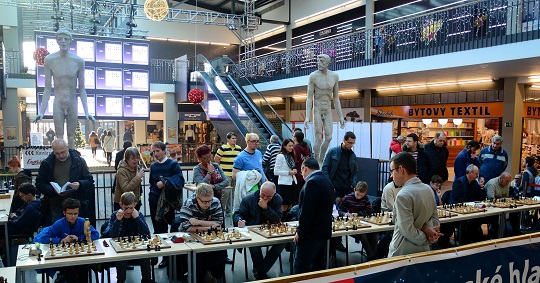
I suggested to Pete that it must have been disconcerting playing with those naked statues staring over his shoulder! Pete reports "What was more disconcerting was the 15min preamble by organisers in Czech - I had no clue what was said! I lost in around 16 moves, the general standard and interest amongst the locals seemed very good."
Lucky escapes
The following game was played in the Manchester League a few years ago. I will not name my opponent to save him embarrassment. And to save myself embarrassment I will not show the first 28 moves of the game, in which I was totally outplayed by an opponent over 30 grading points lower than myself.I am White in the position below and am completely lost. Two pawns down and about to lose the exchange (the attacked rook on g1 can't move without losing its companion on a1 to ...Rh1+). Moreover, my opponent had plenty of time left, whereas I had 30 seconds to make the next two moves to the time control. So rather than resign, I thought I would bang out a couple of moves and then take stock. It seemed a good idea to try for some counterplay by putting a rook on the 7th rank, so...
The following game was played in the final round of the Leek B congress in 2015. The winner would be guaranteed at least a share of first place. Once again I have a hopeless position, having just lost a rook on h1. My only assets are the passed b & c pawns, so I played on in the forlorn hope that I might be able to cause some problems with them.
Reg Clucas v Athar Mehmood
MCF Congress 19-21 August 2016
There was success for two Altrincham players in this congress, with Karl Lockett scoring 4/5 to share second place in the Major (U165), and Samuel Toniolo also scoring 4/5 to share second place in the Minor (U125). Here is one of Samuel's games with his annotations.Samuel Toniolo vs Mark Birch
I (Reg) also played in the Major, but my 2½/5 did not trouble the prizegivers. However, if there had been a prize for the biggest swindle of the tournament, the following game would have been a contender.
Reg Clucas vs Paul Bamford
White is completely lost, so makes a desperate try for a perpetual check. (PGN viewer by http://chesstempo.com)
The same weekend Yaroslav Kolodiy took part in the Chester-le-Street congress, and had one of his best ever wins.
David Walker (218) vs Yaroslav Kolodiy (171)
